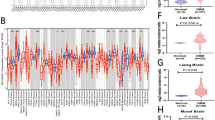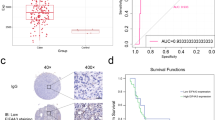Abstract
Glioblastoma (GBM) is one of the most common malignancies among primary brain tumors in adults, featuring a poor prognosis and a high recurrence rate. Eukaryotic elongation factor 2 kinase (eEF2K) is a calcium/calmodulin-dependent protein kinase that is involved in promoting tumor cell proliferation, migration, invasion, and survival. However, its expression level in GBM, its prognostic impact and correlation with immune infiltration are not yet known. In this study, we used The Cancer Genome Atlas (TCGA) database to explore the potential molecular mechanisms of eEF2K in GBM development and clinical prognosis in terms of gene expression, survival status, immune infiltration, and associated cellular pathways. We found that eEF2K expression levels were elevated in GBM, but eEF2K was not associated with the prognosis of GBM patients; eEF2K expression in GBM was associated with multiple immune cell infiltrations. These results show a statistical correlation between eEF2K expression and the development of GBM and immune cell infiltration, which helps us to understand the roles of eEF2K in GBM from different perspectives.






Similar content being viewed by others
Data Availability
Enquiries about data availability should be directed to the authors.
References
Liu XY, Zhang L, Wu J et al (2013) Inhibition of elongation factor-2 kinase augments the antitumor activity of Temozolomide against glioma. PLoS ONE 8:e81345. https://doi.org/10.1371/journal.pone.0081345
Brandao M, Simon T, Critchley G et al (2019) Astrocytes, the rising stars of the glioblastoma microenvironment. Glia 67:779–790. https://doi.org/10.1002/glia.23520
Perry JR, Laperriere N, O’Callaghan CJ et al (2017) Short-course radiation plus temozolomide in elderly patients with glioblastoma. N Engl J Med 376:1027–1037. https://doi.org/10.1056/NEJMoa1611977
Wu H, Yang JM, Jin S et al (2006) Elongation factor-2 kinase regulates autophagy in human glioblastoma cells. Cancer Res 66:3015–3023. https://doi.org/10.1158/0008-5472.CAN-05-1554
Bircan HA, Gurbuz N, Pataer A et al (2018) Elongation factor-2 kinase (eEF-2K) expression is associated with poor patient survival and promotes proliferation, invasion and tumor growth of lung cancer. Lung Cancer 124:31–39. https://doi.org/10.1016/j.lungcan.2018.07.027
Zhou Y, Li Y, Xu S et al (2020) Eukaryotic elongation factor 2 kinase promotes angiogenesis in hepatocellular carcinoma via PI3K/Akt and STAT3. Int J Cancer 146:1383–1395. https://doi.org/10.1002/ijc.32560
Maag JLV (2018) gganatogram: An R package for modular visualisation of anatograms and tissues based on ggplot2. F1000Res 7:1576. https://doi.org/10.12688/f1000research.16409.2
Liu J, Lichtenberg T, Hoadley KA et al (2018) An integrated TCGA pan-cancer clinical data resource to drive high-quality survival outcome analytics. Cell 173:400-416.e11. https://doi.org/10.1016/j.cell.2018.02.052
Kuleshov MV, Jones MR, Rouillard AD et al (2016) Enrichr: a comprehensive gene set enrichment analysis web server 2016 update. Nucleic Acids Res 44:W90–W97. https://doi.org/10.1093/nar/gkw377
Subramanian A, Tamayo P, Mootha VK et al (2005) Gene set enrichment analysis: a knowledge-based approach for interpreting genome-wide expression profiles. Proc Natl Acad Sci USA 102:15545–15550. https://doi.org/10.1073/pnas.0506580102
Yu G, Wang LG, Han Y et al (2012) clusterProfiler: an R package for comparing biological themes among gene clusters. OMICS 16:284–287. https://doi.org/10.1089/omi.2011.0118
Jiang M, Qi L, Jin K et al (2021) eEF2K as a novel metastatic and prognostic biomarker in gastric cancer patients. Pathol Res Pract 225:153568. https://doi.org/10.1016/j.prp.2021.153568
Ashour AA, Abdel-Aziz AA, Mansour AM et al (2014) Targeting elongation factor-2 kinase (eEF-2K) induces apoptosis in human pancreatic cancer cells. Apoptosis 19:241–258. https://doi.org/10.1007/s10495-013-0927-2
Zhu H, Song H, Chen G et al (2017) eEF2K promotes progression and radioresistance of esophageal squamous cell carcinoma. Radiother Oncol 124:439–447. https://doi.org/10.1016/j.radonc.2017.04.001
Ng TH, Sham KWY, Xie CM et al (2019) Eukaryotic elongation factor-2 kinase expression is an independent prognostic factor in colorectal cancer. BMC Cancer 19:649. https://doi.org/10.1186/s12885-019-5873-0
Liu R, Proud CG (2016) Eukaryotic elongation factor 2 kinase as a drug target in cancer, and in cardiovascular and neurodegenerative diseases. Acta Pharmacol Sin 37:285–294. https://doi.org/10.1038/aps.2015.123
Cheng Y, Ren X, Zhang Y et al (2013) Integrated regulation of autophagy and apoptosis by EEF2K controls cellular fate and modulates the efficacy of curcumin and velcade against tumor cells. Autophagy 9:208–219. https://doi.org/10.4161/auto.22801
Karakas D, Ozpolat B (2020) Eukaryotic elongation factor-2 kinase (eEF2K) signaling in tumor and microenvironment as a novel molecular target. J Mol Med (Berl) 98:775–787. https://doi.org/10.1007/s00109-020-01917-8
Ma T (2021) Roles of eukaryotic elongation factor 2 kinase (eEF2K) in neuronal plasticity, cognition, and Alzheimer disease. J Neurochem. https://doi.org/10.1111/jnc.15541
Beckelman BC, Yang W, Kasica NP et al (2019) Genetic reduction of eEF2 kinase alleviates pathophysiology in Alzheimer’s disease model mice. J Clin Invest 129:820–833. https://doi.org/10.1172/JCI122954
Westphal M, Lamszus K (2011) The neurobiology of gliomas: from cell biology to the development of therapeutic approaches. Nat Rev Neurosci 12:495–508. https://doi.org/10.1038/nrn3060
Liu JC, Voisin V, Wang S et al (2014) Combined deletion of Pten and p53 in mammary epithelium accelerates triple-negative breast cancer with dependency on eEF2K. EMBO Mol Med 6:1542–1560. https://doi.org/10.15252/emmm.201404402
Croci DO, Salatino M (2011) Tumor immune escape mechanisms that operate during metastasis. Curr Pharm Biotechnol 12:1923–1936. https://doi.org/10.2174/138920111798376987
Zhang H, Zhou Y, Cui B et al (2020) Novel insights into astrocyte-induced signaling of proliferation, invasion and tumor immune microenvironment in glioblastoma. Biomed pharmacother 126:110086. https://doi.org/10.1016/j.biopha.2020.110086
Golán I, Rodríguez de la Fuente L, Costoya JA (2018) NK Cell-based glioblastoma immunotherapy. Cancers 10:522. https://doi.org/10.3390/cancers10120522
Song J, Kadaba P, Kravitz A et al (2020) Multiparametric MRI for early identification of therapeutic response in recurrent glioblastoma treated with immune checkpoint inhibitors. Neuro Oncol 22:1658–1666. https://doi.org/10.1093/neuonc/noaa066
Walker DG, Shakya R, Morrison B et al (2019) Impact of pre-therapy glioblastoma multiforme microenvironment on clinical response to autologous CMV-specific T-cell therapy. Clin Transl Immunol 8:e01088. https://doi.org/10.1002/cti2.1088
Rosato PC, Wijeyesinghe S, Stolley JM et al (2019) Virus-specific memory T cells populate tumors and can be repurposed for tumor immunotherapy. Nat Commun 10:567. https://doi.org/10.1038/s41467-019-08534-1
Woroniecka KI, Rhodin KE, Chongsathidkiet P et al (2018) T-cell dysfunction in glioblastoma: applying a new framework. Clin Cancer Res 24:3792–3802. https://doi.org/10.1158/1078-0432.CCR-18-0047
Di Lullo G, Marcatti M, Heltai S et al (2015) Th22 cells increase in poor prognosis multiple myeloma and promote tumor cell growth and survival. Oncoimmunology 4:e1005460. https://doi.org/10.1080/2162402X.2015.1005460
Lee M, Park C, Woo J et al (2019) Preferential infiltration of unique Vγ9Jγ2-Vδ2 T cells into glioblastoma multiforme. Front Immunol 10:555. https://doi.org/10.3389/fimmu.2019.00555
Funding
This study was supported by Affiliated Hospital of Youjiang Medical University For Nationalities Scientific Research Foundation (R20196304); Guangxi Science and Technology Program (2019AC20043); Baise county Scientific Research Foundation (BS20193220); Guangxi Academic Degree and Graduate Education Reform Foundation (JGY2020165); Haishan Lu was supported by Guangxi University Young and Middle-aged teachers Scientific Research ability improvement program (2020KY13019). Qian Gu was supported by Affiliated Hospital of Youjiang Medical University For Nationalities Scientific Research Foundation (yy2021sk050). The results shown here are in whole or based upon data generated by the TCGA Research Network: https://www.cancer.gov/tcga.
Author information
Authors and Affiliations
Contributions
All authors contributed to and approved the final manuscript.
Corresponding author
Ethics declarations
Conflict of interest
The authors declare that they have no conflict of interests.
Additional information
Publisher's Note
Springer Nature remains neutral with regard to jurisdictional claims in published maps and institutional affiliations.
Rights and permissions
About this article
Cite this article
Cen, L., Gu, Q., Zhou, X. et al. Eukaryotic Extension Factor 2 Kinase may Affect the Occurrence and Development of Glioblastoma Through Immune Cell Infiltration. Neurochem Res 47, 3670–3681 (2022). https://doi.org/10.1007/s11064-022-03679-w
Received:
Revised:
Accepted:
Published:
Issue Date:
DOI: https://doi.org/10.1007/s11064-022-03679-w




